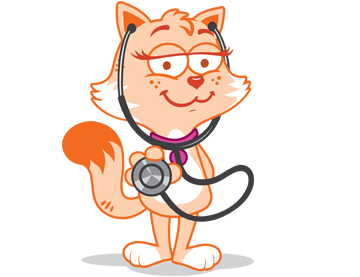Freedom from pain, injury or disease
All cats must receive immediate veterinary attention when they are sick or injured. In most cases unnecessary pain and injury can be prevented through regular visits to a veterinarian.

Did you know that there is a special law protecting animals?
This law is called the Animal Welfare Act. The Animal Welfare Act says that your animal has five groups of welfare needs. These are five groups of things that animals need to be healthy and happy. These five welfare needs are called the Five Freedoms.
Under the Animal Welfare Act all animal guardians (owners) need to provide these five groups of things for their animals. One of these Five Freedoms is: Freedom from Pain, Injury or Disease. In this section you will learn about this freedom and how you can make sure your cat or kitten receives the right medical care, so he or she is free from pain, suffering and disease.





































